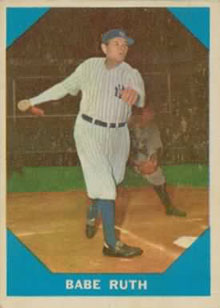 If you're not familiar with this set, Fleer put out a flurry of small competitor sets to Topps in the late 1950s and early 1960s in baseball, football and basketball (actually, basketball is a special case, as sets from this time period are few and far between: Bowman put out a set in 1948, Topps put out a set for the 1957-58 season, and then Fleer came out with a set for 1961-62. So to call them competitors in this particular sport is not exactly accurate. But Topps and Fleer were competitors in baseball, so let's not discuss basketball, if that's okay).
If you're not familiar with this set, Fleer put out a flurry of small competitor sets to Topps in the late 1950s and early 1960s in baseball, football and basketball (actually, basketball is a special case, as sets from this time period are few and far between: Bowman put out a set in 1948, Topps put out a set for the 1957-58 season, and then Fleer came out with a set for 1961-62. So to call them competitors in this particular sport is not exactly accurate. But Topps and Fleer were competitors in baseball, so let's not discuss basketball, if that's okay). Anyway, as mentioned in a previous post, Fleer put out a mega-hero-worship set in tribute to Ted Williams' retirement in 1959. Then, to capitalize on the idea of hero worship, they put out two sets of 'baseball greats' (including the newly retired Williams in both years) in 1960 and 1961. You might think that because the players depicted were not active when the sets were made, these two sets should be grouped under one ranking. I beg to differ. The two series differ greatly, and yes, the difference is enough that would warrant one set finding itself at the bottom of this countdown (1960) and the other somewhere in the middle (1961). There's just that much of a difference.
First, the 1960 design is lacking a, well, a design. If you examine it against the 1961 set, and even its contemporaries (most of which are no prize pigs themselves), it sucks. Four small colored triangles pushed to the edges like sticky photo album corners, framing mostly colorized black and white photos of players posed as if they were wax figures in a poorly lit tableau at a roadside attraction. The back is rather plain, but it does feature a nice clean typeface and a good amount of copy about each player.
Second, when you examine the checklist, it’s really not bad. I mean, as far as a set of old timers goes. It’s got Ruth, Gehrig, Cobb, Mathewson, Speaker, Hubbell, the freshly minted old timer Ted Williams and the ridiculous but seemingly mandatory inclusion of league presidents Frick and Giles (it’s like they were included to remind everyone that old spooks never die). There’s also Jimmie Foxx (spelled ‘Jimmy’), Bob Feller, Honus Wagner, Walter Johnson and Hal Newhouser. But no Monte Irvin. And no Jackie Robinson. You’d of thought that armed with just an 80 card checklist and going against a powerhouse competitor in Topps, Fleer would’ve made more splashes than just the Williams signing in 1959.
The question of Robinson aside, when you think about it today it seems so innocent, if not uncanny: it was Fleer’s second stab at a real, honest-to-goodness baseball card set, coming on the heels of the ‘Williams in ‘59’ campaign (a relatively clean, sharp and to the point set (if over the top in its hero worship)). Flash ahead twenty years to 1982 and you’ve got the same deal playing out (if different circumstances): the company celebrates a court victory and a return to cards with a clean and simple inaugural set in 1981, then gets completely wasted over winter break and hits the sophomore slump with a crappy set in 1982. So, stepping back to 1960, should history be a little kinder to this set?

I don’t think so. It was a major coup to get Williams away from Topps. But after the hoopla died down from his own set, why did Fleer bury him at card #72? Everybody knew how good he was. Shouldn’t the set have confirmed it and placed him in the pantheon of greats in the first ten cards? Or put him as a tacky #1?
In today’s mindset, the idea of doing an old timers’ set isn’t that big of a deal. TCMA made their money doing them in the Seventies, there were plenty of one-offs in the 1990s (The Conlon Collection and The Ted Williams Card Company come to mind) and Topps has done plenty of them since launching the Archives brand in 1991. But it seems like Fleer was really going out on a limb to do this in 1960, and even though the set was kind of lousy, it set the table for a much better set in 1961.
Card scans from Dan Austin's Virtual Card Collection.

No comments:
Post a Comment